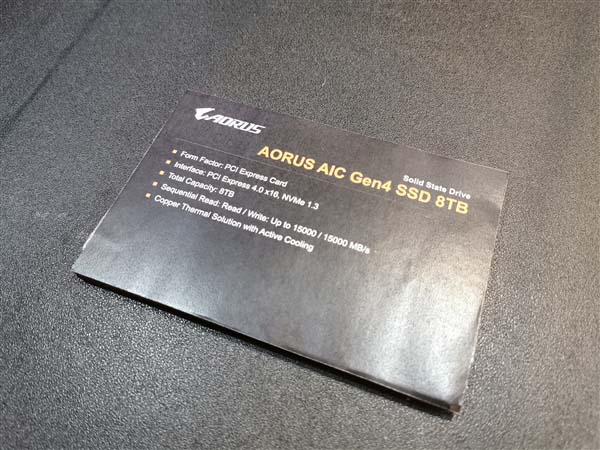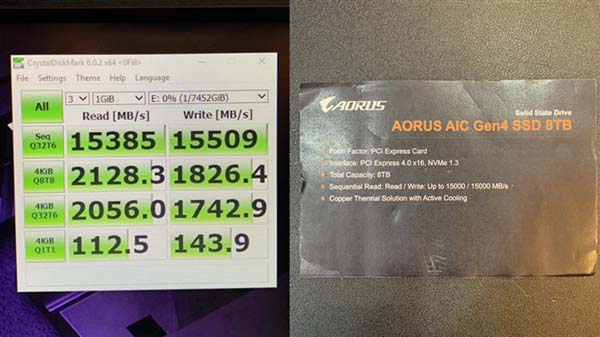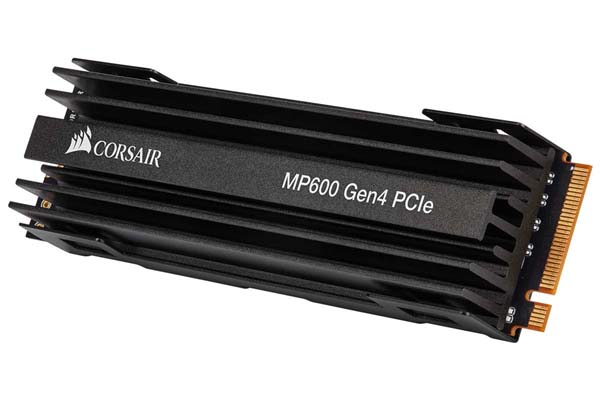Gigabyte releases a new RAID up to 15GB/s by combining four PCIe 4.0 SSDs
AMD Ryzen 3000 series processors and X570 motherboard provides a new generation of PCIe 4.0 specification for the consumer market for the first time. Compared with PCIe 3.0, PCIe 4.0 doubles in speed. Therefore, it’s such high speed that makes PCIe 4.0 be used in solid state drive (SSD) that requires large capacity and high speed.
Recently, cooperating with AMD and SSD manufacturers, Phison have released PS5016-E16, a new generation of PCle 4.0 master. In addition, Galaxy, Gigabyte and Corsair are the first to introduce their PCle 4.0 SSD. Especially, Gigabyte primarily has integrated four PCle 4.0 SSDs to create RAID.
Gigabyte, a leading manufacturer of motherboards and graphics cards, recently has announced the new NVMe architecture and PCle 4.0 interface based M.2 SSD. Gigabyte Aorus Gen4 NVMe SSD with a capacity of 1TB or 2TB adopts standard M.2 2280 specification and Toshiba BiCS4 96-layer TLC flash memory. The sequential read and write performance of Gigabyte Aorus Gen4 NVMe SSD can be up to 5.0GB/s and 4.4GB/s, and its random read and write performance can be 750000 IOPS and 700000 IOPS.
Considering the significantly increasing heat, Gigabyte Aorus Gen4 NVMe SSD uses a full body copper heatsink to bolster heat dissipation during operation. AORUS NVMe Gen4 SSD offers excellent heat dissipation with its full body copper heatsinks and LAIRD high conductivity thermal pad, so heat generated from operation of the device is quickly transferred to the heatsinks. The stylish heatsink design is composed of around 30 fins which have been sandblasted, offering greater heat dissipation surface area without diminishing the strength of the heatsink while also easing crowding around the M.2 slot area with its space efficient design.
To guarantee the most stable and best read/write performance, Gigabyte stress tested the M.2 SSDs with motherboards under rigorous testing conditions. Under various high-load test software with high temperatures and high pressure, the M.2 SSDs have successfully passed the stress tests and are ready to perform so users can expect the best product quality and durability. Gigabyte NVMe Gen4 M.2 SSD is ready for release and will soon be available to users.

Amazingly, Gigabyte combined four such SSDs on a PCIe 4.0 expansion card at the Computex Taipei 2019, and the measured sequential read and write speeds reached 15.4 GB/s and 15.5 GB/s, respectively.
According to Gigabyte, in this expansion card, the system channel was PCIe 4.0 x16, with two-way total bandwidth of 32 GB/s and maximum capacity of 8TB. Both maximum sequential read and write speed were 15 GB/s, but actually they were more than 15 GB/s. This expansion card used active heat dissipation scheme with turbine fans, which was similar to that of public graphics card. We can see from it that the heating was quite high.



By the way, a new PICE 4.0 SSD developed by Corsair is called as "MP600". Its specific TLC flash memory and capacity is unknown. However, it’s expected that its performance is better than that of Gigabyte Aorus Gen4 NVMe SSD. Unlike Gigabyte, its sequential read and write speed are 4950 MB/s and 4250 MB/s, approaching the theoretical limit without exaggerative heat dissipation.
MP600 released by Corsair and three-generation AMD Ryzen platform will go on the market synchronously in July, 2019. MP600 will provide 5-year warranty, but its price has not been announced yet.


